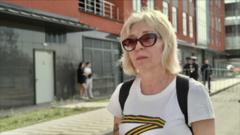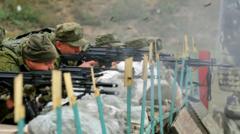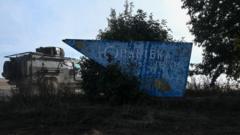In a country steeped in the memories of wartime sacrifice, the celebration of the 80th anniversary of victory in World War II contrasts sharply with Russia's ongoing military actions in Ukraine. Citizens reflect on their familial histories, revealing complex emotions entwined with national pride and loss.
Echoes of the Past: Russia Commemorates WWII amid Ongoing Conflict

Echoes of the Past: Russia Commemorates WWII amid Ongoing Conflict
As Russia prepares to mark the 80th anniversary of its victory in World War II, the legacy of the past intertwines with the current war in Ukraine, igniting poignant memories and national pride.
Eighty miles from Moscow, the sounds of simulated battle reverberate through a park filled with spectators. In a dramatic re-enactment of the final days of World War II, a group of Soviet soldiers storms a bridge while additional reinforcements arrive by boat. As a swastika is torn down, a hammer and sickle takes its place, symbolizing Soviet victory. This vivid scene takes place in Dubna, where Russians gather to commemorate the 80th anniversary of their triumph against Nazi Germany in what is termed The Great Victory.
Katya, an attendee, shares that her grandfather went missing during the war—a legacy now mirrored as her son participates in the ongoing conflict in Ukraine. “He volunteered,” she recounts, highlighting the generational cycle of participation in war. The historical significance of their narratives intertwines deeply with personal loss; her grandfather fought bravely during the Great Patriotic War while her son faces the realities of modern warfare.
Amidst somber reflections, the Kremlin's rhetoric draws parallels between its current military campaign and the fight against fascism in World War II. Andrei Kolesnikov, a columnist for Novaya Gazeta, suggests that the narrative positions today’s military actions as an extension of past struggles, reinforcing the idea of Russia as both hero and victim throughout history.
Despite the changing tides, Russian media promotes a narrative of unwavering resilience, painting the West as untrustworthy, even launching personal attacks on leaders like Germany's Chancellor Friedrich Merz. Meanwhile, new monuments in towns like Khimki blur the lines between WWII and the present, depicting both historical and contemporary soldiers as ongoing defenders of the nation’s legacy.
As the nation gears up for Victory Day, celebrations range from symbolic military parades to emotional recollections at homes and hospitals, where newborns are dressed in battle-inspired attire. The overarching theme of commemoration is pervasive, with imagery of valor that permeates public spaces and hearts alike.
However, while commemorating past victories, current realities of the war in Ukraine evoke a more complex understanding of what it means to be engaged in warfare. The anticipated military parade, attended by global leaders, is marred by the grim acknowledgment of ongoing strife and loss.
Fyodor Melnikov, a 98-year-old veteran, shares a more somber reflection on war’s enduring trauma. His poignant poetry reveals a desire for peace and the chance for future generations to lead lives free from the burdens of conflict.
As Russia prepares to celebrate a significant milestone of remembrance, the duality of history juxtaposes bold nationalism with an acknowledgment of the heavy cost of war—a complex legacy that reverberates through time.


















